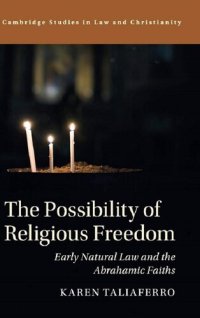
Ebook: Possibility of Religious Freedom: Early Natural Law and Abrahamic Faiths
Author: Karen Taliaferro
- Series: Cambridge Studies in Law and Christianity
- Year: 2019
- Publisher: Cambridge University Press
- City: Cambridge
- Language: English
- pdf
Examines the ancient roots of religious liberty as a response to the clash of human and divine laws
Provides close analyses of classic Greek, Jewish, Christian and Islamic philosophical texts
Develops a unified theory of justice and religious liberty using natural law as a tool for achieving justice in the modern era
Religious freedom is one of the most debated and controversial human rights in contemporary public discourse. At once a universally held human right and a flash point in the political sphere, religious freedom has resisted scholarly efforts to define its parameters. Taliaferro explores a different way of examining the tensions between the aims of religion and the needs of political communities, arguing that religious freedom is a uniquely difficult human right to uphold because it rests on two competing conceptions, human and divine. Drawing on classical natural law, Taliaferro expounds a new, practical theory of religious freedom for the modern world. By examining conceptions of law such as Sophocles' Antigone, Maimonides' Guide of the Perplexed, Ibn Rushd's Middle Commentary on Aristotle's Rhetoric, and Tertullian's writings, The Possibility of Religious Freedom explains how expanding our notion of law to incorporate such theories can mediate conflicts of human and divine law and provide a solid foundation for religious liberty in modernity's pluralism.
Provides close analyses of classic Greek, Jewish, Christian and Islamic philosophical texts
Develops a unified theory of justice and religious liberty using natural law as a tool for achieving justice in the modern era
Religious freedom is one of the most debated and controversial human rights in contemporary public discourse. At once a universally held human right and a flash point in the political sphere, religious freedom has resisted scholarly efforts to define its parameters. Taliaferro explores a different way of examining the tensions between the aims of religion and the needs of political communities, arguing that religious freedom is a uniquely difficult human right to uphold because it rests on two competing conceptions, human and divine. Drawing on classical natural law, Taliaferro expounds a new, practical theory of religious freedom for the modern world. By examining conceptions of law such as Sophocles' Antigone, Maimonides' Guide of the Perplexed, Ibn Rushd's Middle Commentary on Aristotle's Rhetoric, and Tertullian's writings, The Possibility of Religious Freedom explains how expanding our notion of law to incorporate such theories can mediate conflicts of human and divine law and provide a solid foundation for religious liberty in modernity's pluralism.
Download the book Possibility of Religious Freedom: Early Natural Law and Abrahamic Faiths for free or read online
Continue reading on any device:

Last viewed books
Related books
{related-news}
Comments (0)